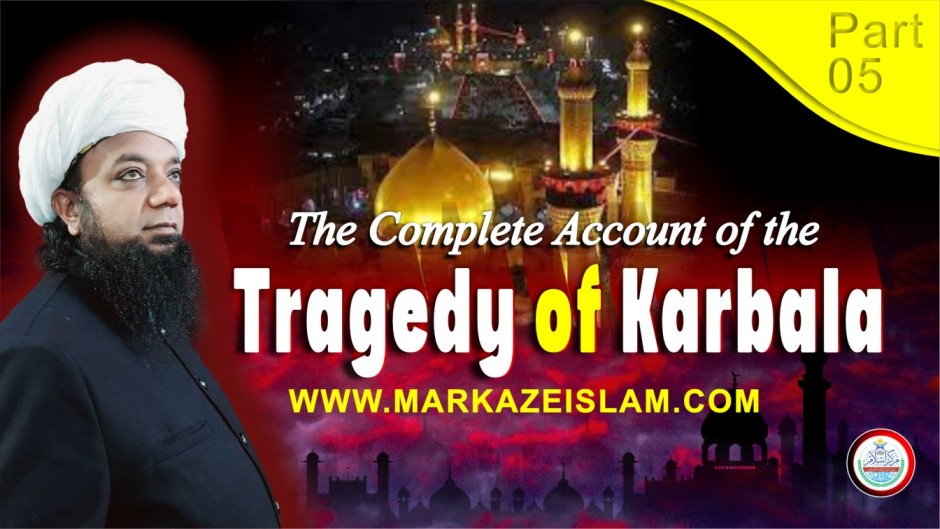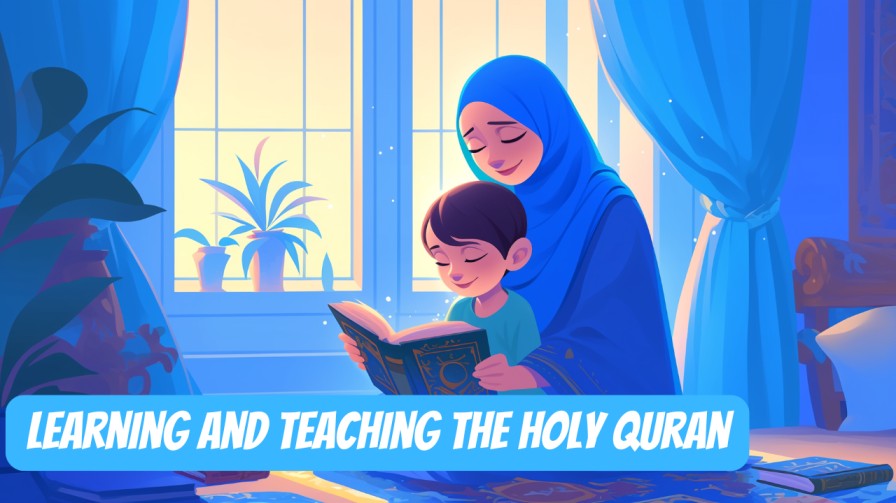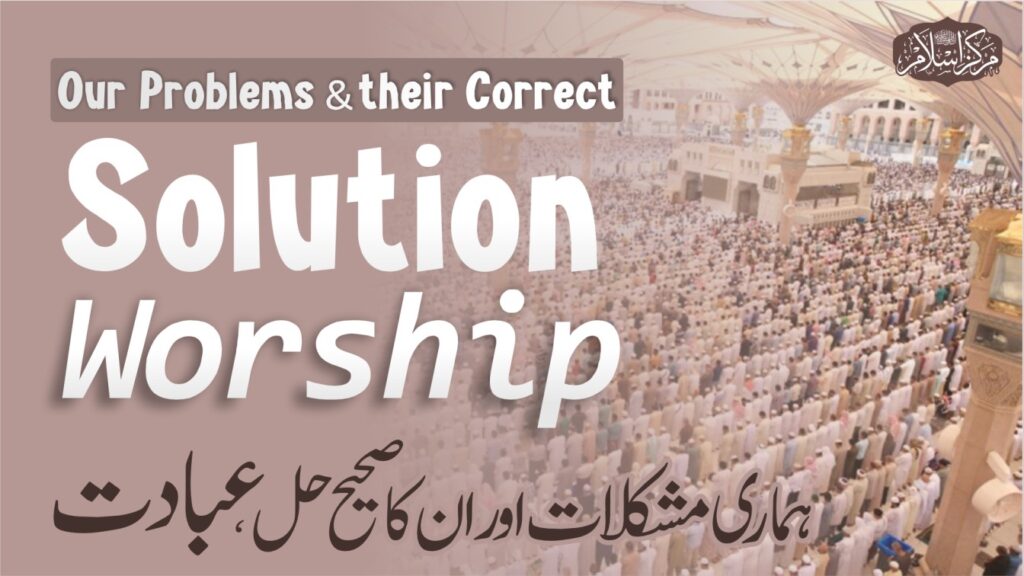When Great Imam Hussain (peace be upon him) set out from Makkah with the intention of going to Kufa, the esteemed Companions (may Allah be pleased with them) tried to dissuade him with tearful pleas. However, the Imam (a.s.) replied, “This is the decision of Allah.” Ibn Ziyad concealed the letters that had been sent, but Hazrat Qais (may Allah be pleased with him) sacrificed his life while delivering the message of truth. The Imam (a.s.) performed the farewell circumambulation (tawaf) of the House of Allah and departed in the direction of Karbala with the caravan of the Ahl al-Bayt (a.s.). This journey was not for worldly power, but solely for the pleasure of Allah, the preservation of religion, and an eternal call of truth against falsehood. The heart bears witness that this was not merely a journey to Karbala, but the pinnacle of sacrifice, loyalty, and divine love.
Table of Contents
The Martyrdom of Imam Muslim and His Sons
When the Great Imam (peace be upon him) reached the fifth stage of the journey, a messenger arrived and informed him of the martyrdom of Imam Muslim (may Allah be pleased with him) and his sons. He also conveyed a summary of the disloyalty and heartlessness shown by the people of Kufa. Upon hearing the news of the martyrdom of Imam Muslim (may Allah be pleased with him) and his sons, a wave of grief swept through the entire caravan. Muslim’s brothers and nephews began to weep and, through their tears, said to the Noble Imam (peace be upon him)…
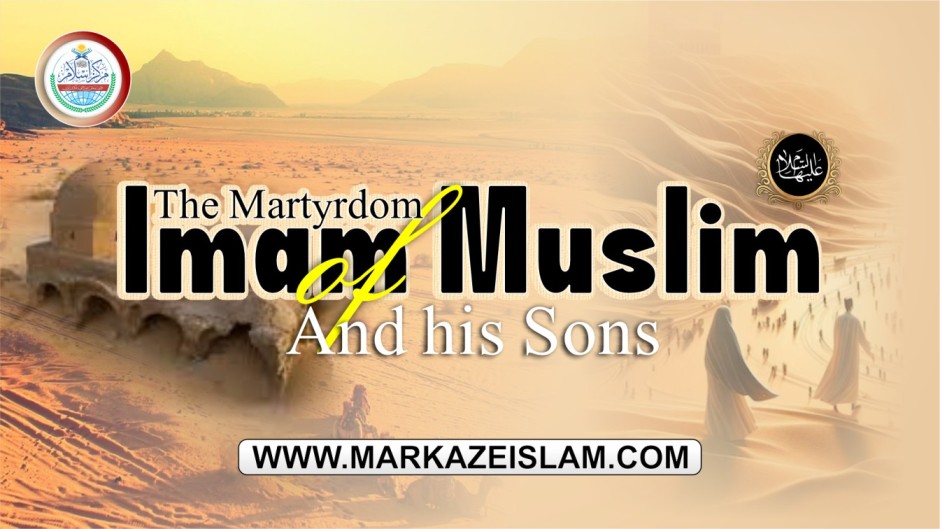
Poem
“Ever since this messenger brought the news, my heart has been heavy with grief.
I find my dear ones, my family, and beloved companions drowning in sorrow.
In my own soul, I feel the ache of parting from the martyred one.
My heart is restless, my spirit inflamed by Muslim’s brutal murder.
I must avenge his blood at the hands of the tyrant, Ubaydullah.
But O dignified ones, O loyal companions of truth!
I say this to you: do not carry the burden of this sorrow—A sorrow that I alone must carry within the depths of my heart.
From my side, you are now free to return.
Let anyone who wishes, depart in peace.
Remaining with me now bears danger—Danger to life, to dignity, and to honor.”
Indeed, this journey may become a path leading to death.”
But each one of those faithful souls rose with dignity and declared:
“To be annihilated in your company is a noble destiny.
If we abandon you now and return to our homes,
What face shall we show to Allah and His Messenger (ﷺ) on the Day of Judgment?
True martyrdom is not gifted—it is earned on the battlefield of sacrifice.
Eternal life is granted only to the one who dies in the path of Allah.”
After listening to the heartfelt expressions of martyrdom and self-sacrifice from all his devoted companions, the Noble Imam once again advanced his journey. Upon reaching the sixth station, he halted. This was where the border of Qādīsiyyah met the area known as Zubālah.
Here, the Imam brought his caravan to a stop. By this point, he had become fully aware of the complete abandonment and treachery of the people of Kufah. From every direction, the shadows of tyranny and oppression loomed, and the deceitful intentions of both the Yazidites and the Kufans had become more evident than the sun itself.
At this stage too, the Sultan of Karbala addressed all his companions with utmost compassion and sincerity, saying:
“Why should you all suffer hardship because of me? I willingly grant permission to each of you to return home. Go back to your families, and may Allah bless your path.”
Upon hearing this gracious declaration from the Noble Imam, the sons of Aqeel folded their hands with utmost respect and humbly submitted:
“Master, we shall never do such a thing!
Our lives and wealth are a small offering at your noble feet.”
Then Muslim ibn ‘Awsajah, in a tone filled with devotion and burning passion, said:
“Even if we are unarmed, we shall fight your enemies to defend you, and we shall lay down our lives in your service without hesitation.”
Sa’d ibn ‘Abdullah (may Allah be pleased with him) exclaimed:
“O how I wish I could be killed for you seventy times, and each time my body be burned and turned to ashes—even then, I would never abandon your side!, I wish that all my family and children could be sacrificed for you, and that Allah may protect you through them.”
(References: Ṭabarī, Vol. 7, p. 316; Kāmil Ibn al-Athīr, Vol. 4, p. 28)
And at this point, Tariq ibn Abdul Aziz appears in the service of the Imam, the Most High, and asks the Imam to change his intention of going to Kufa. In return, the Imam, the Most High, prayed to Tariq and said:
Poem
Why return home, when I hold no power to turn away?
The pleasure of my Lord remains my guide in every way. Whatever has been written by the Pen of Fate shall be, This thirst for martyrdom alone has led us to this field, you see.
It is the longing for this death that drew our souls so near, And joy we find in that decree where God has placed us here.
Be it sorrow or be it ease, complaint is not our right, For man must thank his Lord alone in every shade and light.
Not for our glory have we come, nor for the sake of name, We step into this battlefield for Islam’s noble aim.
Our way is patience, firm resolve, with hearts that do not break, Even beneath the slashing sword—we chant the Maker’s name and wake.
The Great Imam departed from the sixth station and proceeded onward, arriving at the place called Bayḍā, and from there continued his journey until he reached Qasr Bani Muqātil. Upon reaching this location, he observed a cloud of dust rising and advancing from the distance. Witnessing this dust storm, the Imam immediately discerned that it must be the army of Shām (Syria).
And indeed, after a short while, the Syrian army appeared before them. This army was led by Ḥurr ibn Yazīd al-Riyāḥī, a man known for his bravery and valor on the battlefield.
Suddenly, this army came forward and encircled the caravan of the Great Imam. At this moment, the Imam of Truth turned toward them and addressed them directly:
“You know very well who I am.
You also know my lineage very well, that I am the son of the conqueror of Khaybar.
I am the beloved son of Zahrā (Fatimah al-Zahrā).
I am the light in the eyes of Muṣṭafā (the Prophet ﷺ).
Loving me is loving Allah and His Messenger,
and enmity toward me is enmity toward Allah and His Messenger.
My grandfather is the Intercessor of the Day of Judgment, My father is the Cupbearer of Kawthar, My uncles are ‘Aqīl and Ja‘far, The Beloved of God (ﷺ) raised me with affection, and Fāṭimah nourished me with her very life’s blood.
For me, Jibrā’īl (Gabriel) brought gifts from Paradise.
For the sake of God, refrain from enmity with me.
Save yourselves from the blazing fire of Hell!”
This soul-shaking speech of the Imam of Truth moved even the hardest of hearts. Those who listened found their eyes filled with tears, and many were overcome with uncontrollable weeping. Others fell into a state of stunned silence, unable to respond to the overwhelming emotion and truth conveyed in the Imam’s words.
Poem
“When the people of the army heard your solemn speech, They stood in reverence, as valiant warriors each.They said, “We sent no letters, nor a messenger did we send, If someone deceived Your Grace, it was not by our hand.”
“The Pure Imam then called upon his loyal page,
To bring the letters stored, preserved without damage. He said, “Bring forth the letters—sealed and unrevised, Both satchels hold them safely—each word, each line survives.”
“Then Hur replied, “O noble one, the people of Kufa lied, They joined in treachery and misled you with pride. But now we stand by the command of our ruler and lord, We must take you to Ubaydullah, by the governor’s word.”
“It is our assigned duty, O Grandson of the Prophet’s line, We must fulfill the task, though the choice is not mine.” “Husayn ibn Numayr,” he said, “our chief commands this field, Under his authority, this army’s power is sealed.”
“Yazid rules in Damascus—it would be better, perhaps, If you write to him directly and bridge the present gap.”
“And we, in turn, will send a plea to Kufa’s domain, If both courts permit, your journey may continue again.”
In the Court of Sayyiduna Husayn (عليه السلام)
Imam al-Husayn (عليه السلام) attentively listened to all that Ḥurr had to say. After hearing him out, the noble Imam addressed him, saying:
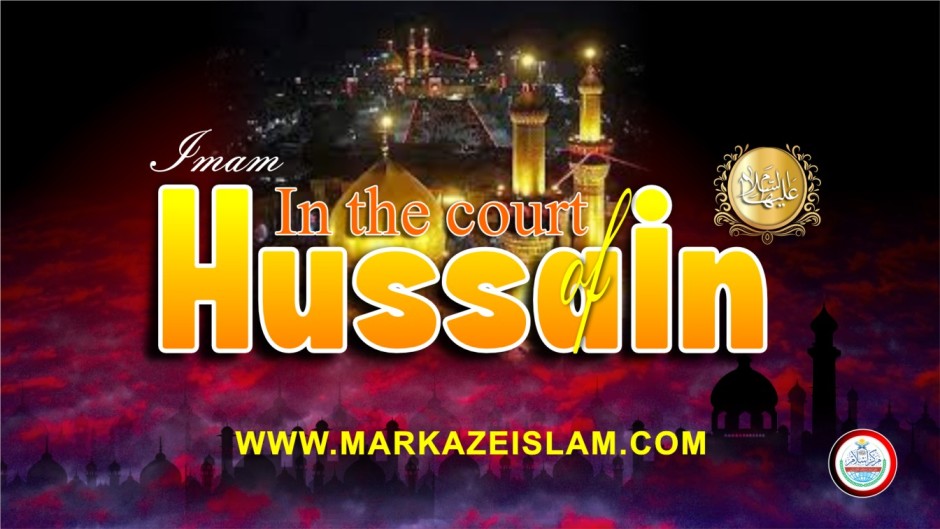
“O valiant Ḥurr! The two men whose names you have mentioned (Yazid and Ibn Ziyad) — neither of them is worthy of obedience, for both are utterly unfit for leadership. The so-called Amir, Yazid, has turned his back on the obedience of the Creator of the Universe. He flagrantly violates the clear commands of the Qur’an. He holds neither concern nor regard for the religion or the nation. He makes no distinction between what is lawful (ḥalāl) and what is forbidden (ḥarām). In his eyes, Islam holds no sanctity. He is constantly in submission to his own desires and the whisperings of Shayṭān. He has no regard for the sacred Shari‘ah.
It is absolutely impossible for me to ever accept him as one of the ulu’l-amr (those worthy of authority). In my eyes, he is nothing but a traitor, a deceiver, and a usurper. His wickedness has become more manifest than the sun to the entire world. Because of his character, Islam is under constant threat.”
Upon hearing this blessed discourse from the Imam, Ḥurr humbly and respectfully submitted before Sayyiduna Husayn (عليه السلام):
“O Master! Everything you have declared is indeed true and just. Each word is correct and resonates with the spirit of truth and freedom. Your every utterance is a source of reality, the very soul of religion and the spirit of faith. Your words are the adornment of the Sacred Law of Mustafa (صلى الله عليه وآله وسلم), the shining sun for all Muslims, the springtime of the garden of Divine Unity, and a manifest expression of the commands of Allah and His Messenger (صلى الله عليه وآله وسلم). They are a living commentary on the Noble Qur’an and the Glorious Furqān. To entertain even the slightest doubt about what you have said is sheer negligence and a betrayal of Islam itself.”
The Command of the Imam of Truth
(Irshād-e-Imām-e-Ḥaqq)
Poem
At Ḥurr’s bold words, the Imam of Truth was overtaken with wrath, His veins stirred, and in the blood of Ḥaydar rose a storming path.
He proclaimed with thunder, “I am a lion from Hāshim’s line, Though to the eye I may seem bare, without shield or sign.
I am the son of the Lion of God — this truth you well do know, I am the son of courage itself — this too you surely show.
I am the grandson of Abū Ṭālib — a truth you must retain, The grandson of Muḥammad al-Muṣṭafā (ﷺ) — do you know that name?
O ignorant soul! Do you think to scare me with talk of death?
My feet upon the path of Truth shine with eternal breath.
In the fire of wrath, in the gaze of divine rage so pure, Ḥurr saw before him the sword of death drawing near for sure.
In grief and fury, the Imam made firm his travel’s intent, The majesty of Hāshim’s wrath left Ḥurr shaken, bent.
Once the step is taken upon the path of Holy Jihād, No decree of destiny’s pen can ever be withdrawn or flawed.
The warriors never retreat once they plant their feet on sand, Those who fear their Lord alone, will never fear a tyrant’s band.
This poem depicts the courageous conversation between Imam Hussain (ʿalayhis-salām) and Ḥurr, when the Imam was being pressured to submit to falsehood.
With dignity and majestic firmness, Imam Hussain (ʿa.s.) declared his noble lineage, elevated status, and unwavering purpose — that he is the son of the Lion of God, ʿAlī (ʿa.s.), the grandson of Abū Ṭālib (ʿa.s.), and the beloved grandson of the Holy Prophet Muḥammad ﷺ. He made it clear that no force, no threat of death, could ever intimidate him in the path of Truth.
The poem powerfully expresses Imam Hussain’s steadfast resolve, complete trust in Allah, and his fervent spirit of jihād fī sabīlillāh. His words instilled awe and fear into the heart of Ḥurr.
This poem offers a glimpse into the unparalleled steadfastness, bravery, and sacrifice of Imam Hussain (ʿalayhis-salām) for the cause of true religion.
The Final Destination
Thus, the Imam of unmatched stature (ʿalayhis-salām) resolved to continue his journey, and as they travelled onward, they eventually reached the land of Ṭaff, which is also known as Karbala. Upon arriving here, the noble Imam (ʿalayhis-salām) halted and addressed all his companions, saying:
“Once, I came to this very place with my father, Hazrat ʿAlī (Karramallāhu Wajhah). When my revered father beheld this land, he burst into uncontrollable tears and said, ‘This is the place where the lush and blooming garden of Mustafa ﷺ will be reduced to withered ruin. This is the land where the tents of the family of the Messenger ﷺ will be pitched, and the noble sons of Hāshim will be tormented for even a single drop of water.’ Then, embracing me tightly to his chest, he said, ‘O light of my eyes! This is the land upon which you shall sacrifice your head for the preservation of the religion.’”
It was here that the Imam (ʿalayhis-salām) gave the command to set up camp. As the stakes of the tents were driven into the earth, fresh blood would seep from the ground; and whenever a branch from a tree was broken, a fountain of blood would gush forth.
This sacred caravan arrived and encamped in the field of Naynawā on 2nd Muharram al-Harām, corresponding to 9th October, 680 CE — a caravan for which no parallel can be found in the entire world. Its women were the daughters of Zahrāʾ (ʿalayhas-salām), the Leader of the Women of Paradise. Its commander was he who once rode upon the shoulders of the Messenger ﷺ. The stars of the heavens kissed his turban, and the grains of the desert bowed to kiss his feet.
This was a caravan that completed its journey and came to rest on a land where death carried with it the glad tidings of eternal life.
The noble Imam (ʿalayhis-salām) then proclaimed…
Poem
“Here the enemy shall shed our blood,From this land, We too shall not return alive.”
“There will be a massacre here of the entire family of the Prophet (peace be upon him), All will offer their heads while parched with thirst.”
“Each martyr here shall be a jewel of Mustafa, And from the field of slaughter, we shall carry back the bodies and remains.”
“Meanwhile, in the court of the executioner Ibn Ziyād, A messenger arrives bringing news from the banks of the Euphrates.“
Now the journey of Medina to Karbala has ended.
“This journey holds a message for me: Sometimes the path of truth is a lonely one, yet it is that very path which changes the course of history. The Imam (peace be upon him) showed that sacrifice is not merely of the body, but for the survival of an ideology. And it was this yearning for martyrdom that brought the noble Imam (peace be upon him) all the way to Karbala.”
To Be Continued Soon
This informative and spiritually enriching blog is the result of the compilation and authorship of Hazrat Pir Abu Nauman Rizvi Saifi Sahib, who continues to guide the Muslim Ummah with sincerity and devotion on matters of faith and spirituality.If you found this article beneficial and insightful, we humbly request you to share your valuable thoughts in the comments below. Kindly share it with your friends, family, and others, so that this message may reach as many hearts as possible.If you would like to see this blog series continue, please let us know in the comment section below—we would love to hear from you.

